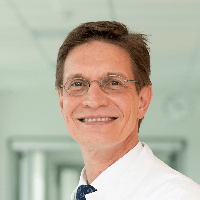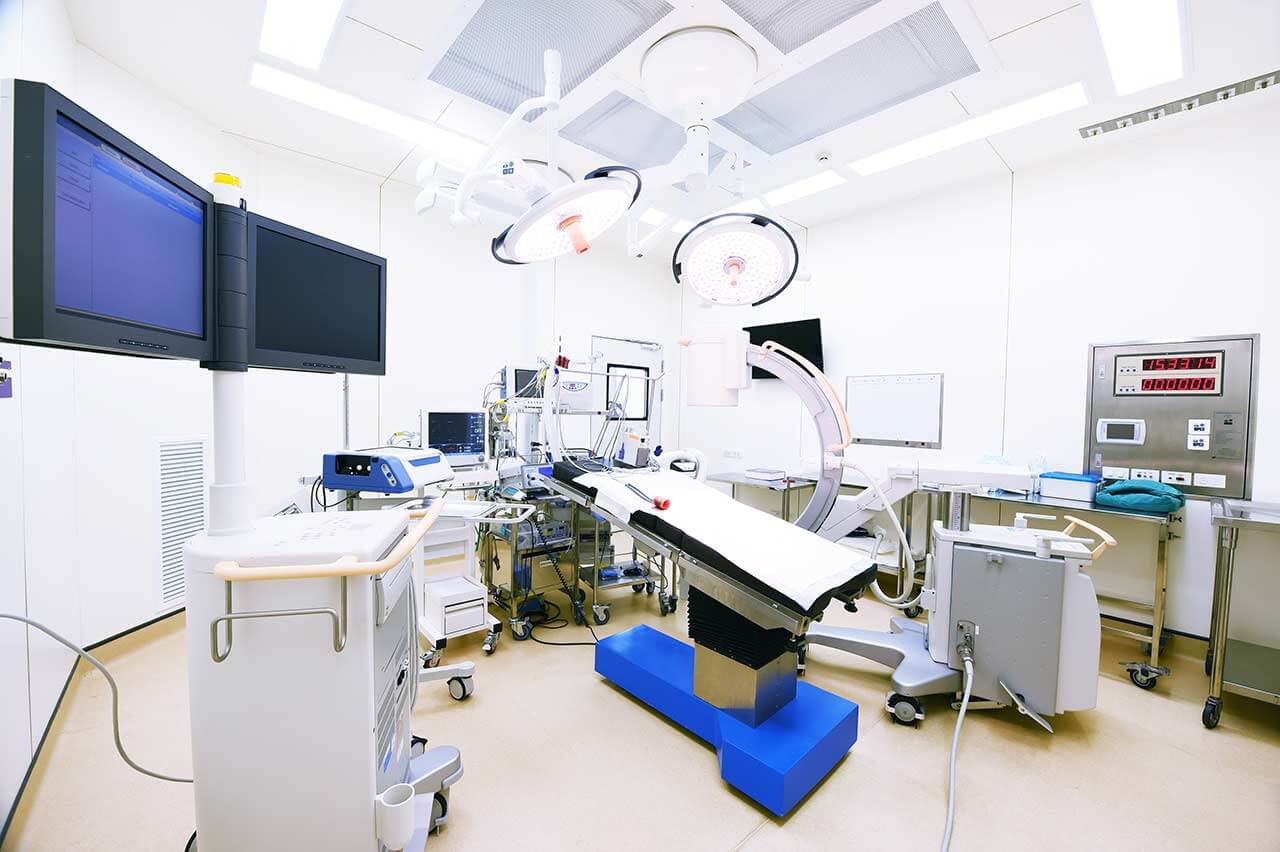
The program includes:
- Initial presentation in the clinic
- clinical history taking
- review of medical records
- physical examination
- laboratory tests:
- complete blood count
- general urine analysis
- biochemical analysis of blood
- inflammation indicators (CRP, ESR)
- indicators blood coagulation
- hormonal examination
- TSH, fT3, fT4
- antibodies against thyroid peroxidase
(TPO antibodies)
- thyroid ultrasound
- thyroid scintigraphy if indicated
- consultation of related specialists
- symptomatic specific treatment
- the cost of essential medicines and materials
- nursing services
- control examinations
- full hospital accommodation
- developing of further guidance
Required documents
- Medical records
- Results of hormone blood tests (if available)
Service
You may also book:
 BookingHealth Price from:
BookingHealth Price from:
About the department
The Department of Gastroenterology, Hepatology, Nephrology, Infectology, Endocrinology and Diabetology at the University Hospital Bonn offers the full range of diagnostic and therapeutic services in these fields. The department specializes in the treatment of diseases of the gastrointestinal tract, liver, kidneys, endocrine organs, including diabetes mellitus, as well as the treatment of infectious diseases. Of particular interest is the treatment of oncopathology of the digestive tract and liver, as well as rare hereditary intestinal tumors (in collaboration with the Center for Integrated Oncology). In addition, the therapeutic options include liver, kidney, and pancreas transplantation. The department's doctors have both classical and innovative methods of diagnostics and therapy, thanks to which they achieve high rates of treatment success. The department is headed by Prof. Dr. med. Christian P. Strassburg.
In the field of gastroenterology and hepatology, the department offers conservative and endoscopic diagnostics, effective treatment of diseases of the gastrointestinal tract, pancreas, liver and biliary tract, portal hypertension, treatment of inflammatory liver diseases, including hepatitis B and C, as well as the diagnostics and treatment of other types of gastroenterological and liver diseases. The department has state-of-the-art Laboratory for Functional Gastroenterological Diagnostics, in which both traditional and special laboratory tests are carried out.
Another important focus of the department’s clinical activities is nephrology. The department employs high-class specialists, who provide the effectively treatment of all kidney diseases, hypertension, and systemic diseases caused by the damage to the kidneys or blood vessels (such as systemic lupus erythematosus or Wegener's granulomatosis). The department offers patients all modern types of renal replacement therapy, including kidney transplantation and combined transplantations (simultaneous transplantation of the kidney and pancreas, kidney and liver). Such methods of blood purification as hemodialysis, peritoneal dialysis, plasmapheresis, etc. are available here as well.
In addition, the department provides qualified medical care to patients with infectious diseases. The department's specialists mostly have to deal with such pathologies as HIV, tuberculosis, hepatitis C, and tropical infections.
In the field of endocrinology, the focus is on the diagnostics and treatment of diseases of the thyroid gland, pituitary, adrenal glands, disorders of bone, and calcium-phosphorus metabolism. The department is equipped with modern ultrasound systems, which make it possible to accurately determine the nature of changes in the endocrine organs. In addition, the diagnostic range is complemented by functional examinations, for example, pituitary function tests and dexamethasone suppression test, thyroid scintigraphy (in collaboration with the Department of Nuclear Medicine). The department's doctors also have vast experience in the treatment of type 1 and type 2 diabetes mellitus, gestational diabetes. The main type of therapy include insulin therapy, proper nutrition, lifestyle modification.
The service range of the department includes:
- Diagnostics and treatment of diseases of the gastrointestinal tract and liver, including the oncological ones
- Esophageal disease
- Stomach diseases
- Bowel disease
- Liver diseases
- Bile duct diseases
- Pancreatic disease
- Diagnostics and treatment of kidney disease
- Acute and chronic kidney diseases
- Arterial hypertension
- Systemic diseases caused by kidney damage
- Kidney stone disease
- Disorders of water and electrolyte metabolism and acid-base balance
- Diagnostics and treatment of infectious diseases
- HIV infection
- Tuberculosis
- Hepatitis C
- Tropical infections
- Diagnostics and treatment of endocrine diseases
- Thyroid diseases
- Pituitary diseases
- Bone metabolism disorders
- Phosphorus-calcium metabolism disorders
- Adrenal gland diseases
- Gonad disorders
- Type 1 and type 2 diabetes mellitus, gestational diabetes
- Lipid metabolism disorders
- Other medical services
Curriculum vitae
Education and Professional Experience
- 1986 - 1993 Study of Medicine at the Hannover Medical School and Pennsylvania State University College of Medicine, Philadelphia; PhD thesis defense, Internship in Internal Medicine and Gastroenterology, Department of Gastroenterology, Hepatology and Endocrinology, Hannover Medical School (Head: Prof. Dr. med. M. P. Manns).
- 1995 Admission to medical practice.
- 1996 ECFMG certification, USA.
- 1996 - 1998 Postdoctoral Fellow, University of California, San Diego, Cancer Center and Department of Pharmacology (German Research Foundation).
- 2000 Doctoral thesis defense and Venia Legendi (Hannover Medical School).
- 2001 Certificated Therapist and appointed as a Senior Physician in the Department of Gastroenterology, Hepatology and Endocrinology, Hannover Medical School.
- 2001 - 2012 Managing Senior Therapist of the Section of Interdisciplinary Liver Transplantation at the Hanover Transplant Center.
- 2002 - 2005 Heisenberg Scholarship of the German Research Foundation.
- 2005 Certificated Therapist/Gastroenterologist.
- 2005 - 2012 Head of the Department of Gastroenterology, Hepatology and Endocrinology, Hannover Medical School.
- Since 2012 Head of the Department of Gastroenterology, Hepatology, Nephrology, Diabetology, Endocrinology and Infectology at the University Hospital Bonn (W3 Professor, Department of Internal Medicine I).
Awards and Honors
- 1997 Pete Lopiccola Fellowship Award, University of California, San Diego.
- 1998 Dr. Norbert Henning Prize in Gastroenterology, University of Erlangen.
- 2004 Genetics Committee Member of the International Autoimmune Hepatitis Group.
- 2006 Appointment as an Extraordinary Professor.
- 2006 Secretary of the Annual Congress of the German Society for Digestive and Metabolic Diseases (DGVS), Hannover.
- 2007 Appointment as W2 University Professor in Gastroenterology, Department of Gastroenterology, Hepatology and Endocrinology, Hannover Medical School.
- 2008 Scientific Committee of the International Society for the Study of Xenobiotics (ISSX), Regional Meeting, Lisbon.
- 2009 Appointment as W3 Professor and Head of the Department of Gastroenterology at the University Hospital Rostock (refusal).
- Since 2009 Deputy Chairman of the Organizing Committee on Liver Diseases of the German Transplantation Society (DTG), position on the Eurotransplant Liver Intestine Advisory Committee (ELIAC).
- 2011 Elected Chairman of the Liver and Intestine Committee (DTG), Member of the Eurotransplant Liver Intestinal Advisory Committee, Organ Transplantation Committee (StäKO), German Medical Association and Federal Expert Group on Liver Diseases of the AQUA Institute.
- 2012 Position of W3 Professor in Internal Medicine and Head of the Department of Gastroenterology, Hepatology, Nephrology, Diabetology, Endocrinology and Infectology at the University Hospital Bonn.
- 2013 Board Secretary of the German Transplantation Society.
- 2015 President of the North Rhine-Westphalian Society of Gastroenterology.
- 2016 BÄK Scientific Advisory Board.
- 2016 Position of President of the German Transplantation Society.
- 2017 President of the 26th Annual Meeting of the German Transplantation Society, Bonn.
Main Clinical Focuses
- Clinical gastroenterology and hepatology, internal medicine.
- Chronic and acute diseases of the biliary tract, infectious and non-infectious diseases of the liver, liver tumors, genetic liver diseases.
- Diagnostic and interventional endoscopy, ultrasound examination.
- Transplant medicine.
- Immune-mediated and autoimmune diseases.
Main Research Focuses
- Molecular carcinogenesis.
- Molecular mechanisms of the barrier functioning of the mucous membrane in the gastrointestinal tract.
- Metabolism, drug and xenobiotic metabolism, pharmacogenetics.
- Basics of liver transplantation and chronic liver disease.
- Developmental mechanisms of the liver fibrosis.
- Autoimmune liver diseases, autoimmune serology and genetics.
- Gene regulation and signal transduction in inflammatory and neoplastic diseases.
- Diagnostics and development of therapeutic regimens for the treatment of genetic diseases of the gastrointestinal tract and liver.
Membership in Professional Societies
- German Society for Digestive and Metabolic Diseases (DGVS).
- German Association of the Study of the Liver (GASL).
- European Association for the Study of the Liver (EASL).
- German Transplantation Society (DTG).
- German Society of Internal Medicine (DGIM).
- American Association for the Study of Liver Diseases (AASLD).
Photo of the doctor: (c) Universitätsklinikum Bonn
About hospital
According to the authoritative Focus magazine, the University Hospital Bonn ranks among the top ten medical facilities in Germany!
The hospital was opened on January 1, 2001, although in fact it inherits the medical facility, which operated at the Faculty of Medicine of the University of Bonn. The hospital in Germany combines all the highest standards of modern university medicine of the international level. A highly competent team of experienced physicians, which consists of more than 8,000 employees from various fields, takes care of the patients’ health.
The hospital has 32 specialized departments and 23 institutes, which implement the highest standards of treatment in Germany. On their basis, in addition to the successful clinical activities, the productive research and training of young specialists are carried out. Also, the hospital has 10 intensive care units and more than 30 cutting-edge operating rooms. They are equipped with the advanced surgical, navigation and monitoring systems, which provide sparing and the most effective surgical treatment. The total number of places for hospitalization is 1,250 beds.
The hospital presents all fields of medicine, while many of them are awarded by prestigious German and international certificates. For example, in 2007, the Comprehensive Cancer Center of the hospital became one of the four winners at the nationwide competition among Cancer Centers of Excellence. The research focuses primarily on the clinical genetics and genetic epidemiology, neurology, immunology and infectiology, hepatology and gastroenterology, and diseases of the cardiovascular system. The research findings contribute to the development of new therapeutic methods and overall improvement of treatment in Germany.
The main value for all employees of the hospital in Germany is human health, his individual needs and wishes, therefore, despite the high-tech infrastructure, the focus remains on the human attitude and respect for each patient.
Photo: (с) depositphotos
Accommodation in hospital
Patients rooms
The patients of the University Hospital Bonn live in cozy single, double and triple rooms, designed in bright colors. The standard room furnishing includes a comfortable bed with a remote control, a bedside table, a wardrobe, a table and chairs, as well as a TV and a telephone. Each patient room is equipped with an ensuite bathroom with toilet and shower. The hospital also provides enhanced-comfort rooms.
Meals and Menus
The patients of the hospital are offered tasty and balanced three meals a day: breakfast, lunch and dinner. Every day each meal features three different menus, including a vegetarian one. If you for some reason do not eat all the food, you will be offered an individual menu. Please inform the medical staff about your dietary preferences prior to the treatment.
Further details
Standard rooms include:
Religion
Christian priests are available for the patients at any time. Representatives of other religions may be requested at any time.
Accompanying person
Your companion may stay with you in your room or at a hotel of your choice during the fixed program.
Hotel
You may stay at the hotel during the outpatient program. Our employees will support you for selecting the best option.
The hospital offers a full range of laboratory tests (general, hormonal, tests for infections, antibodies, tumor markers, etc.), genetic tests, various modifications of ultrasound scans, CT scans, MRI and PET / CT, angiography, myelography, biopsy and other examinations. Treatment with medications, endoscopic and robotic operations, stereotaxic interventions is carried out here, modern types of radiation therapy are also used. The hospital offers patients all the necessary therapeutic techniques.
- Surgical treatment of the brain tumors, tumors of spinal cord and spine
- Replacement of all joints, resection arthroplasty
- Deep brain stimulation and vagus nerve stimulation in patients with epilepsy
- Multimodal complex treatment of Parkinson disease
- Thoracic endovascular aortic repair (TEVAR)
These are benign and malignant breast pathologies, malignant tumors of various localizations, neuromuscular diseases, stroke, retinal pathologies and various visual impairments, infertility, autoimmune diseases, epilepsy, coronary artery disease and myocardial infarction, leukemia and other pathologies.
- Ophthalmology
- Epileptology
- Reproductive medicine
- Hematology and oncology
- Neurosurgery
Over 8,000 highly qualified doctors and other employees work at the hospital.





